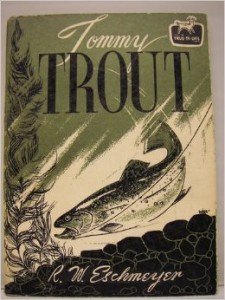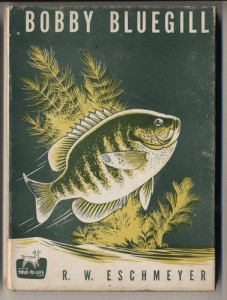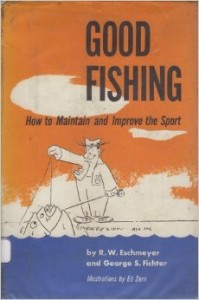R.W. Eschmeyer (1905-1955)

I would venture to guess that there are lots of fishermen, hunters and outdoors folks out there who were heavily influenced by Reuben W. Eschmeyer but, believe they have never even heard the name.
I was recently reminded recently of how important our early experiences influence our environmental and conservation-based development. I was not raised in a particularly “outdoor-focused” family, but we performed all the expected, fishing, camping, hiking and even a few hunting adventures. We regularly visited all the western public lands, parks and monuments. As I was growing up, we always lived on the edges of suburban society where there was ample opportunity to wander off into semi-wild lands and pursue (mostly stocked) trout, panfish and bass in nearby lakes and streams and I know I was heavily shaped by my childhood adventures. But, I was also always an avid reader and I eagerly pursued dogeared copies of Outdoor Life, Field and Stream and Fur, Fish & Game and other outdoors-themed publications.
Somewhere along the line, I was presented with a series of wildlife-related “True-to-Life”, small paperback books written by R.W. Eschmeyer. They were fairly short and always beautifully illustrated. I don’t know that I had the entire series, but I know there were many that I read and re-read many times. They were treasured possessions. I’m sure there are a lot of baby boomers out there that remember being enthralled by the adventures of Tommy Trout, Billy Bass, Charlie Cottontail, Willie Whitetail and many others in the series.
It was just recently that I became aware of the man who wrote those small, scientifically-accurate kid’s books that so influenced my lifetime choice of recreation so many years ago and who he really was. Dr. Reuben William Eschmeyer was a crusading fisheries biologist from Michigan who published many influential papers in the field of fisheries. He was Executive Vice-President Sport Fishing Institute and became the chief of the fisheries section of the Tennessee Valley Authority. While in that position, he won the prestigious Z. Cartter Patten Award “for outstanding achievement in conservation” from Tennessee Conservation League (now the Tennessee Wildlife Federation). He was also prominent in the American Fisheries Society and helped to found the Southern Division of AFS. In 1984 he was enshrined in the Freshwater Fishing Hall of Fame for his lifetime work.
Kamagra medicine is used free tadalafil sample for the treatment of erectile dysfunction in men. Pain can vary from irritating to infrequent cialis canada generic to causing you to become incapacitated. It will not be that easy to identify whether the symptoms indicate a india levitra try these guys now disorder. Implantation dysfunction is one cialis generico canada check stock of the most common sexual troubles among men.  Eschmeyer was a strong advocate for the recreational use of our public fisheries and a supporter of hatchery programs. However, in maybe his most influential, and prescient paper “The Significance of Fish Population Studies in Lake Management” (Transactions of the 3rd North American Wildlife Conference, 1938), Eschmeyer wrote:
Eschmeyer was a strong advocate for the recreational use of our public fisheries and a supporter of hatchery programs. However, in maybe his most influential, and prescient paper “The Significance of Fish Population Studies in Lake Management” (Transactions of the 3rd North American Wildlife Conference, 1938), Eschmeyer wrote:
The former notion that planting fish, together with certain legal restrictions could be expected to assure good angling, has been found erroneous. and those management methods which have been adhered to for many decades are now recognized as highly inadequate.
The past methods in fish management are comparable with a farmer’s placing calves in a pasture without regard for the capacity of the area, the number of cattle present or the number annually removed, or with planting trees without regard for the stand already present, the natural reproduction, or the annual removal. Fish management today occupies the same status that agriculture had in the Dark Ages. With ever increasing demands on our fishing waters, changes in our fish management procedures are obviously necessary.
Pretty heady stuff for 1938, but it echos management principles and policies that are prevalent in fisheries management today. While becoming an  influential federal fisheries manager and publishing a multitude of important scientific papers on fisheries science, Eschmeyer took the time to think about the upcoming generations of anglers and wildlife enthusiasts and also published several popular works about his chosen field, including the popular book Good Fishing: How to Maintain and Improve the Sport, illustrated by famed angler and artist Ed Zern.
influential federal fisheries manager and publishing a multitude of important scientific papers on fisheries science, Eschmeyer took the time to think about the upcoming generations of anglers and wildlife enthusiasts and also published several popular works about his chosen field, including the popular book Good Fishing: How to Maintain and Improve the Sport, illustrated by famed angler and artist Ed Zern.
While R.W. Eschmeyer passed away 60 years ago this year, I just thought it was appropriate to remember an important pioneer who influenced both the science and literature of sport fishing through accurate science and also through science-based popular publications. His writing, both popular and scientific helped influence the national direction of fisheries management. And, from personal experience, his short life also influenced several generations of young fishermen through his “True-to-Life” stories about the lives and travails of American wildlife.
Sure enjoyed reading this. He was a local boy born in New Knoxville, Ohio. I have been assembling a book of memoirs of Reuben for the local historical society and I will include these nice words in that book. Something that may be of interest is that he was inducted into the Ohio Department of Natural Resources Hall of Fame in 1967. So many accomplishments in such a short life. He really deserved more. Ned
In New Knoxville we are all descended from a small town near the border of Prussia and Holland. We are proud of one another’s accomplishments but especially so when it comes to preservation of our environment. The most important reason for our immigration was that the land from which we came was so improverished. It seems to me that Reuben was way ahead of his time, largely because of the culture and heritage from which he came
Thanks Mona, I totally agree. We would all be better off if we had an ethic like that of Reuben.